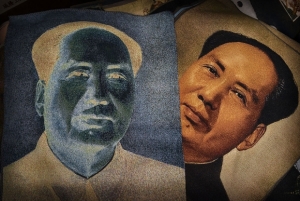A ChinaFile Conversation
REBECCA E. KARL, MICHAEL SCHOENHALS, ANDREW J. NATHAN, RICHARD BERNSTEIN, HO-FUNG HUNG, SEBASTIAN HEILMANN , RODERICK MACFARQUHAR, JUDE BLANCHETTE, RICHARD H. SOLOMON, SUISHENG ZHAO, STANLEY LUBMAN02.12.15
 Kevin Frayer—Getty Images
Kevin Frayer—Getty Images
Mao Zedong portraits for sale in a Beijing market.
“Comrade Mao, whether he was crossing ‘a sea of surging waves’ or scaling ‘a mountain pass impregnable as iron’ always held unwaveringly to his course, setting a shining example for the Chinese Communist Party.” —Xi Jinping
“‘These mountains so decorated / Look even more beautiful today. We have blazed a shining path, and we must continue to press onward.’ This Marxist viewpoint, combined with Chinese ideals and fighting spirit, will fire our hearts as we advance bravely and tirelessly down the road of socialism with Chinese characteristics, toward our dream of igniting a renaissance for the Chinese people.” —Xi Jinping quoting Mao Zedong’s poem “Dabodi,” about the landscape after a battle between Communists and Nationalists in 1929.
“Strengthening ideological education on university campuses plays a strategic role in consolidating and tempering Party leadership in higher education, thoroughly implementing the Party’s educational principles, and ensuring the continued existence of socialism with Chinese characteristics. It is of profound importance for cementing Marxism’s position as an ideological guiding force and as the common ground for the united struggle of the Party and the people of China.” —Yuan Guiren, Minister of Education
It has long been standard operating procedure for China’s leaders to pay tribute to Mao. Even as the People’s Republic he wrought has embraced capitalist behavior with ever more heated ardor, the party he founded has remained firmly in power and his portrait has stared out over Tiananmen Square toward the squat building where his body reposes peacefully at the heart of a country he would scarcely recognize. But since Xi Jinping’s arrival at the helm, Mao’s words have seemed to reverberate more loudly. From the rejection of liberalism that colors the internal Party directive known as Document 9, to Education Minister Yuan Guiren’s recent speech demanding an “ideological campaign,” to Xi’s own speeches which seem to reference Mao and Marx far more often than his predecessors’, Chinese politics under Xi seem to have taken a hard ideological turn. How significant is this phenomenon and what does it mean? Is Mao still dead? —The Editors
For detail please visit here
